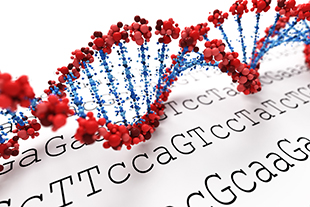A study conducted by the Metformin Genetics (MetGen) Consortium with more than 13,000 diabetes patients has shown that a specific variant in the glucose transporter gene GLUT2 has an effect on the long-term blood glucose level (HbA1c) in response to metformin therapy. Glucose transporters are proteins that are responsible for transporting glucose through the cell membrane. The glucose transporter GLUT2 is produced in humans in the kidneys, liver and small intestine and is encoded by the gene SLC2A2, among others.
Under the direction of Professor Wolfgang Rathmann, scientists at the German Diabetes Center (DDZ) have investigated the extent to which the treatment effect of metformin differs in patients with recently diagnosed type 2 diabetes with and without this genetic variant. In the prospective German Diabetes Study, they conducted a genetic analysis of 508 participants with recently diagnosed type 2 diabetes (mean age: 53 years, 65 percent male). "We specifically looked at variants in the SLC2A2 gene and investigated possible effects on fasting blood glucose levels," said Professor Michael Roden, chairman of the German Diabetes Center and the German Center for Diabetes Research (DZD). The results were published in the journal Diabetologia.
Patients with a C allele showed greater blood glucose reduction
Study participants with a specific variant of this gene (C allele) reported more diabetes symptoms than non-carriers of this gene at the time of their diabetes diagnosis. Among the 45 percent of participants who were treated with metformin alone, there was a greater reduction in blood glucose levels in carriers of the C allele (24 percent) than in non-carriers within the first year after diagnosis. Carriers of the variant recorded a reduction of 6.3 mmol/l (114 mg/dl) between the diagnosis of diabetes and the time of measurement in the first year thereafter, compared with 3.9 mmol/l (70 mg/dl) for non-carriers. The difference persisted after a statistical adjustment of the values in terms of age, gender, body mass index (BMI) and diabetes duration of the participants. However, such blood glucose differences were only seen in patients who controlled their blood glucose with metformin monotherapy. There were no differences in patients who additionally took another antidiabetic drug.
Conclusion: Genetic variant modifies glycemic response
There could be various reasons why people with diabetes with the relevant variant in the glucose transporter gene respond better to a blood glucose reduction by metformin. The researchers suspect that the blood glucose lowering agent metformin inhibits glucose formation in the liver and promotes the absorption of glucose into the muscle. Gene analyses of tissue samples of the liver have revealed that the SL2A2 gene is less active in humans with the C allele and the protein encoded by the gene, the glucose transporter GLUT-2, also shows lower activity. Scientists suspect that metformin positively influences this genetic deviation and helps the glucose transporter become more active.
Original publication:
Rathmann W et al. A variant of the glucose transporter gene SLC2A2 modifies the glycaemic response to metformin therapy in recently diagnosed type 2 diabetes. Diabetologia Februar 2019 https://doi.org/10.1007/s00125-018-4759-z

